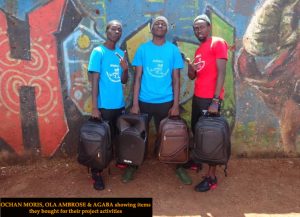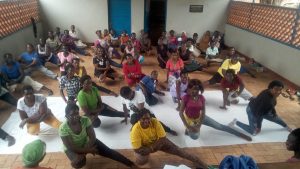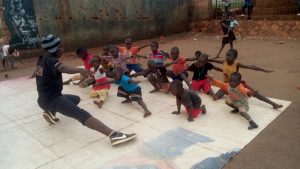OLA AMBROSE, the man behind the fitness sessions with our women

Can you please tell me about yourself?
My names are Ola Ambrose, I reside in Acholi quarters Kampala but I was born in Pader district in northern Uganda way back in 1995 that is on 8th of June, I was born in a village called Lee Ogweyo that is in Pader. It’s been quite a lot have passed through to reach where I am right now. My father was shoot dead 6 month before I was born. I have lived with my mother since I was born till 2004 when she was killed by HIV/AIDs. We became orphans six in number born from the same mother. The first born was married in a village somewhere in northern Uganda.
What challenges have you faced?
It wasn’t easy, first of all my father died even before I could see him. I stayed with my mother for quite few years and then she died so we remained alone as total orphans. My mother died in 2004 and life wasn’t easy, with the help of God we managed to overcome some of these circumstances. Our elder sister who was the first born of the family was married somewhere but since we were young we didn’t know but as we grew we started realised that she was married. After the death of our mother, they told her (Oldest sister) to come from where she was so as to take care of us since we were suffering and all alone. She had to first agree with the family of her husband if she could leave and move with her husband to central Uganda, but the husband disagreed. So, she left her husband and came and started taking care of us but we were young and my sister was also very young. She helped us cope up with the challenges we were facing.
In which year did you come to Acholi quarters?
We came in 1996 when I was one year old and my mother came along with us because of the war that was taking place in northern Uganda. She brought us to Kampala and we resided in Acholi quarters beginning in 1996. We came as a family because it our mother who brought us we were very young children so she just carried us and brought us during the war.
What was her source of income for a living?
Our mother when she was still in northern Uganda, she used to have a restaurant. She used to cook but the challenges she used to face that time was, some of the food used to be eaten by the rebels. The rebels used to eat her food and some could not pay. So, the day she denied rebels food, they came and found that she had never prepared food, then they went away. My mother realised and told everyone from the village to depart, to run away because she sensed something, so that’s how she escaped and brought us to Kampala. So, when she came to Kampala, she used to go and pick the food that she used grow and brings them to Kampala in a while. She brings them and sells then from there the war became too much so she decided to stay this side and she changed her occupation. She resorted to stone quarrying, stone mining, she also started buying food items from Nakawa a market in Kampala then, sold them in Acholi quarters to other people in the community.
When you came to Kampala, did you start schooling?
When I came to Kampala I was not schooling at the beginning but after sometime, my mother took me to a Universal Primary Education (UPE) school that was free of charge near Acholi quarters by then. The school which was called Kireka barracks. That’s where I used to school with other friends of mine and some other big brothers of mine so we used to go and school from there.
How did you encounter Meeting Point International MPI and in which year?
I knew MPI in 2018, that’s the year I knew MPI and it was through madam Teddy. When I was still a kid, I used to see MPI. We used to come to MPI and they would teach us how to draw pictures. I grew up seeing MPI. I thank God that in 2018 we got in touch because Teddy is like a mother to us as well. So, she introduced me, my siblings and other friends of mine in February 2018 and all these happed through the activities we do at MPI that is yoga session, acro-yoga and health education that we were doing with the mothers there.
How did you get the sponsorship at MPI?
I remember when Teddy introduced us to MPI, we did a yoga session with the mothers like three times then Rose called me. She asked me to meet her and I accepted and asked if I could come along with my siblings. We met her the following day. When we entered her office, she welcomed us and we really loved it she was smiling. She asked us to introduce ourselves. We were three guys doing the sessions with the women, so we introduced ourselves. Talked about how we lived our lives and how we coped with school because some of us studied but due to school fees and tuition couldn’t go ahead. She told us to go to any school and get an admission. We came out all us just smiling at each other very happy. That’s how the whole sponsorship came in.
What really attracted you to MPI and why did you think you were chosen?
First of all, when we came to do the sessions, what really inspired us was because we had passion in what we were doing, we loved what we were doing so it really inspired us. What inspired us was seeing the young people of Acholi quarter having the potential to do something to our mother, we had the potential to give back to our mothers. It might not be financially but we were boosting the health of our mothers through the sessions we were doing. In this we had the of yoga, acro-yoga and health education plus some other parts of also dancing with the mothers. In that process the mothers started gaining some changes in their health status so Rose was very happy because she saw the passion we had, she saw the motivation we had and when reached her office, she told us that is very rare to find young people like us doing whatever we have been doing.

What do you do currently for a living?
Currently, I am unemployed but I just do casual work, any kind of work which can at least earn me a living. I just do pottery work like helping builders at construction sites. It’s not a permanent job so you can even work a few days then wait for another chance. So, in this construction sites you have to do any kind of work. I used to do all kind of work that was really required of me so I did any work available so long as it could help me and my family. This brought contribution because we help each other. That’s how we survive though it’s not easy but that’s how we try.
Do you have any other activity that you do besides the construction work?
During our free time, we normally teach the community just like we normally do with the mothers. We don’t only do it the mothers, we do it even to the whole community like even teaching the young people as well so we do the yoga, acro-yoga and health education with the community too, leadership and communication cycle that is we do it as a project. We do the b-boy dancing with some few youth and kids who got inspired by what we. This is mainly to promote togetherness among we the young people and to teach the young people good morals and values in their lives. At first when we just began this activity we had a lot of criticism in the community were most parents were against us thinking that we may mis-lead their children but latter they realized the benefit and started to send their children in large number.
Can you tell me about how your project began and how you manage it?
We named our project New Hope Dance Project Uganda. It’s a project that came out of passion. For the love, we had to learn certain things. We always moved around to learn new things like the dances. It was a way of killing stress. When our mother died, we used to find possible ways to relieve ourselves from stress. So, we went around and started learning the type of dance that our friends introduced us. We started copying up with the dances slowly until 2009 when we formed a crew. We used to perform around and earn some little money and balance it with other jobs. We had to get other possible ways of earning some money like learning more of the dances, yoga, acro-yoga and some other activities like leadership skills, community saving, community sanitation then later in 2016 we formed the project officially we called it New Hope Dance Project Uganda. That’s when we opened and started teaching the community because we believed we had gained enough skills to share with others so, we started teaching the young people in the community and other people outside our community. In February 2018 Teddy who was our good friend also introduced us to MPI so we started doing a session with them as well. That’s how we started running the project. It was passion that made us do all these.
Do you have any support from any organisation to help you in this project?
We never had support but thank God we met MPI and they really appreciated the work that we were doing, they helped us with certain needs that we really wanted for the project since we lacked certain things like speakers and uniforms. So, they offered us some funds which we used to buy speakers, uniform, shoes, we bought a camera. We really working with MPI.
What inspired you to really open up this project?
At the beginning it wasn’t a project because we were just doing everything as a way of relieving stress after our mom’s death because after our mother’s death we were just trying to cope up with the new life when things were not easy. So, friend of ours introduced us to dancing so we started coping with the dancing slowly. We used to be relieved so we continued dancing. With that inspiration we got from friends around, we started learning how to dance. We also got inspired by prominent dancers like the late Michael Jackson, Usher Raymond and Chris Brown. We used to watch videos and copy some of the styles of the dancing. We never had access to dancing schools so we just learnt from friends. We used to move far from Acholi quarters to look for friends who had more ideas in dancing.

And how about the future goals for this project?
First of all, we are so happy that MPI has gone ahead to help us with the project, Rose plus the entire MPI offered our project 3,000,000 Ugandan Shillings to buy our necessities. So, we bought shoes, clothes, carpets, radio and these days we just love to train. In fact, we got more motivation to create and to share and in fact even our project has grown bigger. We were so happy for that.
We would like better training ground such that we can engage more people from the community. Then we are also looking if there is a possibility of our project getting into an entrepreneurship. In a way that we are taught entrepreneurship skills such that we can have some businesses for the project so that we can become self-funded.
by Okello Marvin
